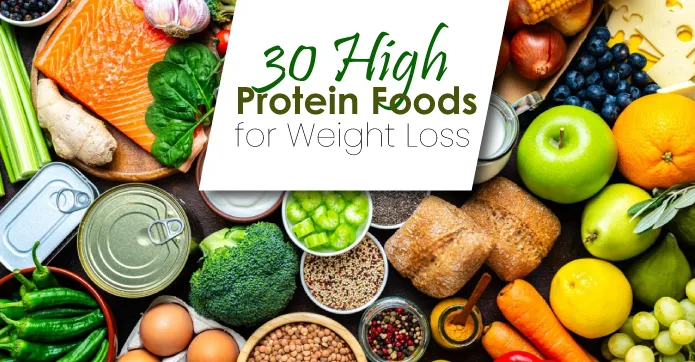Protein should be your go-to food if you want to shed some pounds and keep lean muscles. These are a vital group of molecules that play an essential role in the body by supporting cell structure, boosting the immune system, enabling movement, fueling chemical reactions, and even aiding hormone production. A diet rich in satiety and protein helps satisfy your hunger, accelerates your metabolism, and elevates calorie burn, making your weight loss goal easier and more sustainable in the long run.
Proteins are made of amino acids, which our body needs. Nine of them are essential and must be obtained through diet. The recommended dietary allowance (RDA) for protein is 0.8 grams per kg of body weight. The RDA is the minimum protein your body needs for basic functions. Whether you want to lose weight, make your body leaner and more attractive, or enhance your overall health, incorporating protein-rich meals into your diet can positively impact your results.
Whether you are a vegetarian or a non-vegetarian, here are high-protein foods options that will boost your protein intake in various ways. Protein for belly fat reduction is key, as it helps promote satiety and supports fat-burning processes. Are you prepared to explore? Now, look at 30 of the best high-protein foods you can include in your diet for weight loss.
1. Eggs
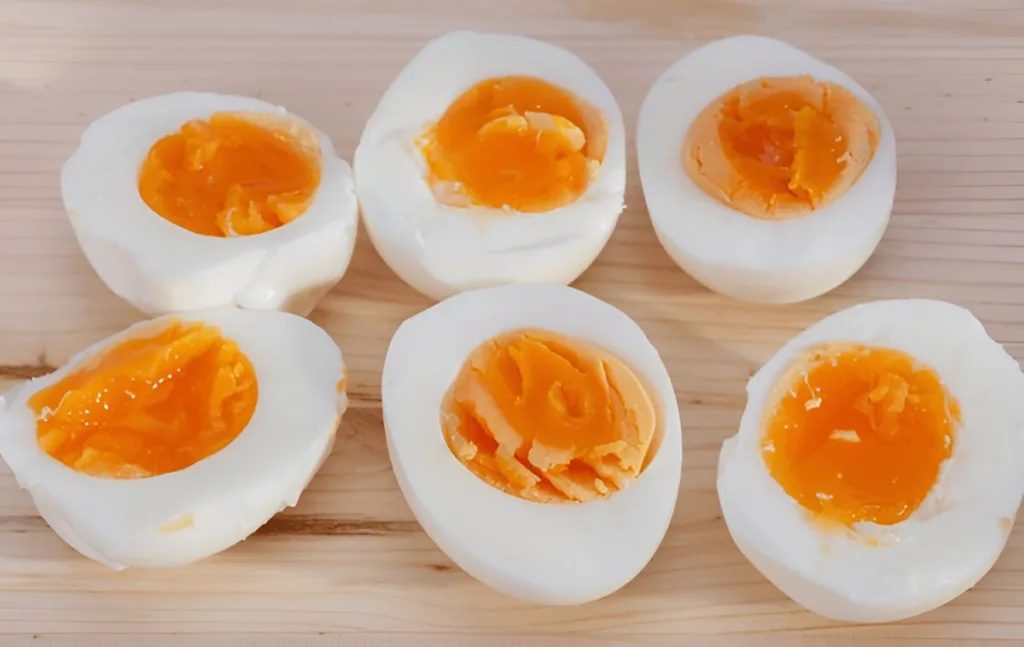
Eggs are an excellent source of protein and can be easily absorbed by the body. They contain essential vitamins and minerals, healthy fats, and antioxidants. Having eggs for breakfast nourishes your body and keeps you full for longer.
Egg whites for weight loss provide pure protein, while whole eggs include the yolk, offering a rich blend of nutrients, including vitamins, minerals, and healthy fats. This combination makes them an excellent protein source supporting weight loss goals.
2. Greek Yoghurt
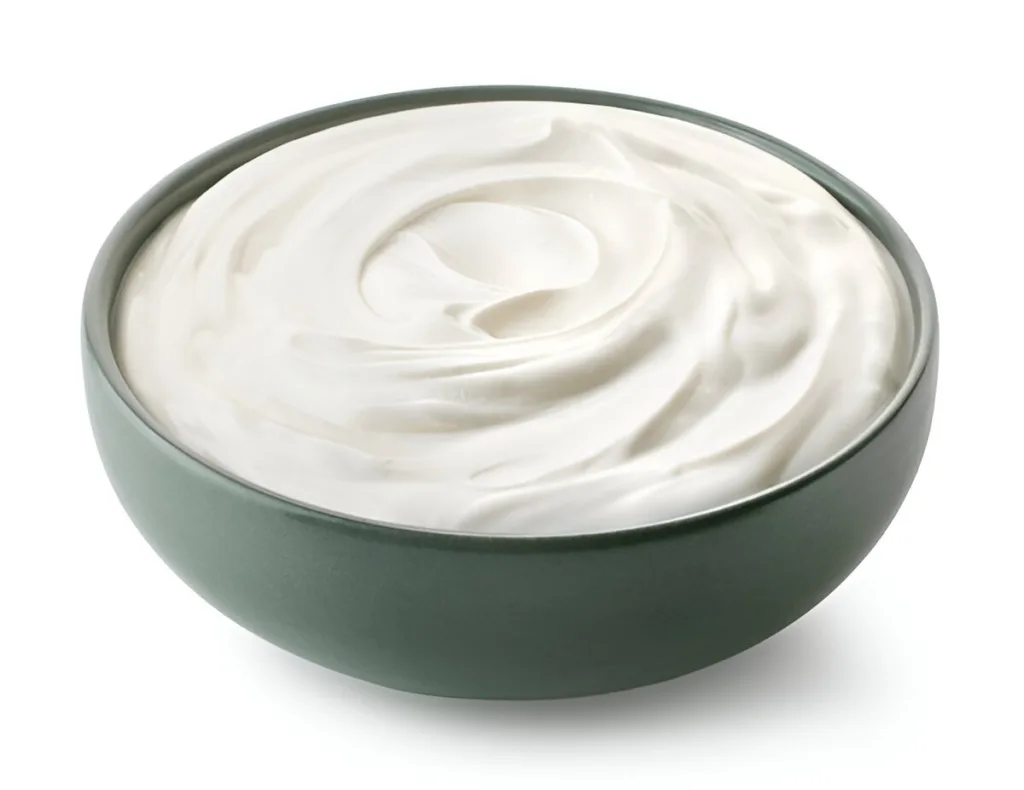
Greek yoghurt is a thick, creamy version packed with protein. It is enriched with proteins and provides essential nutrients like calcium, vitamin B12, vitamin A, selenium, and zinc. Greek yoghurt protein is particularly known for supporting muscle maintenance and satiety. Its thick and rich texture on breads or salads makes it an ideal choice for snacks and breakfast bases.
200g of yoghurt contains around 19.9 grams of protein, instantly boosting your protein intake.
If you want specifically high-protein yoghurt options, unsweetened low-fat yoghurt that offers around 11.9 grams per 8-ounce serving and kefir that gives you around 8.21 grams of protein per cup are the best options.
Protein content: 15-20 grams per ounce serving.
3. Cottage Cheese
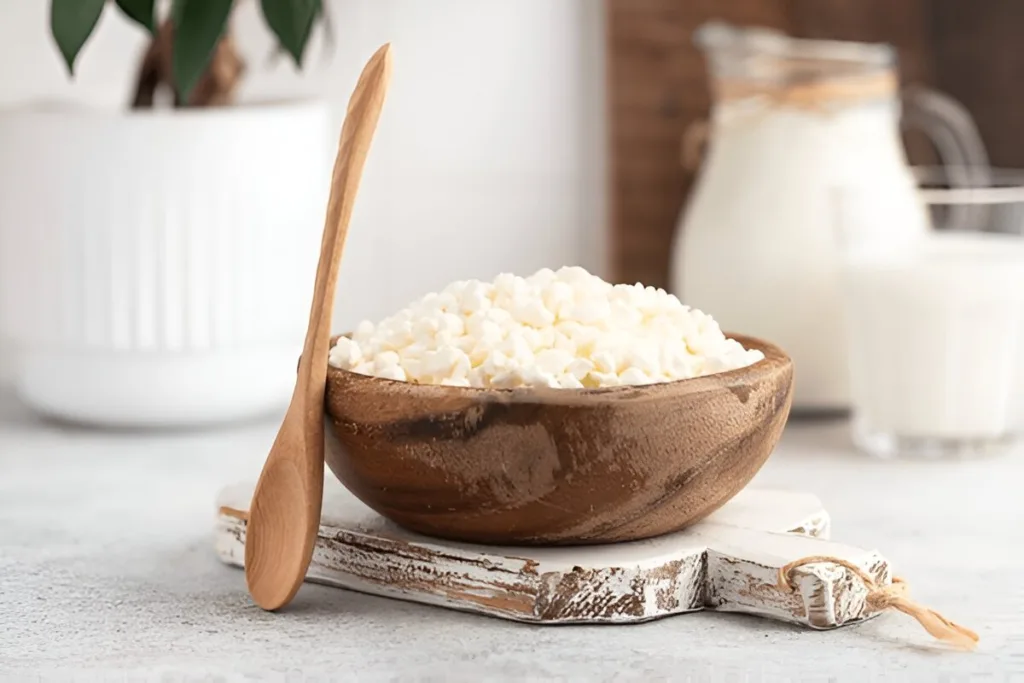
Cottage cheese is a low-fat, low-calorie cheese that is a vibrant source of protein. It also contains calcium, phosphorus, selenium, vitamin B12, and riboflavin, making it a nutritious and versatile choice for snacks and meals.
Cottage cheese: 1 cup (226 g) provides 28 grams of protein.
Mozzarella cheese: It provides 6.29 grams of protein per ounce.
Cheddar cheese: A 17 g slice of cheddar cheese provides 3.96 grams of protein.
Protein content: 14 grams per ½ cup
4. Quinoa
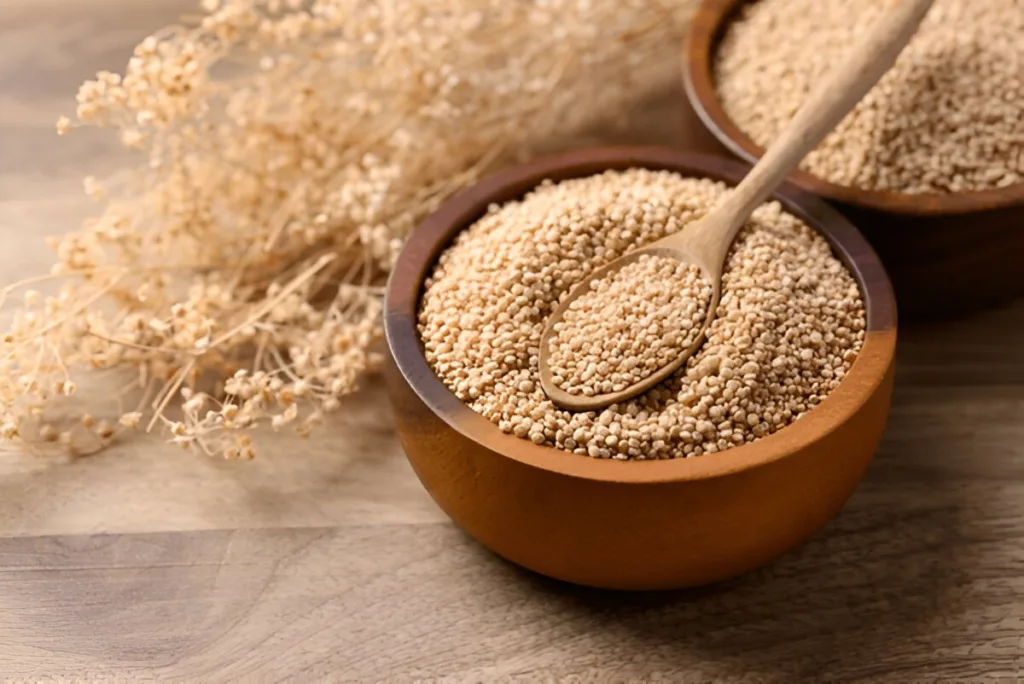
Quinoa is a complete protein package, enriched with all nine essential amino acids, though it is lower in leucine. It is filled with fibre, folate, iron, copper, and zinc for better health and weight-loss management.
One cup (185 g) of quinoa offers approximately 8 grams of protein, a beneficial plant-based protein option, especially for vegetarians. Its rich nutrient profile supports metabolic health and provides needed minerals for the body.
5. Lentils
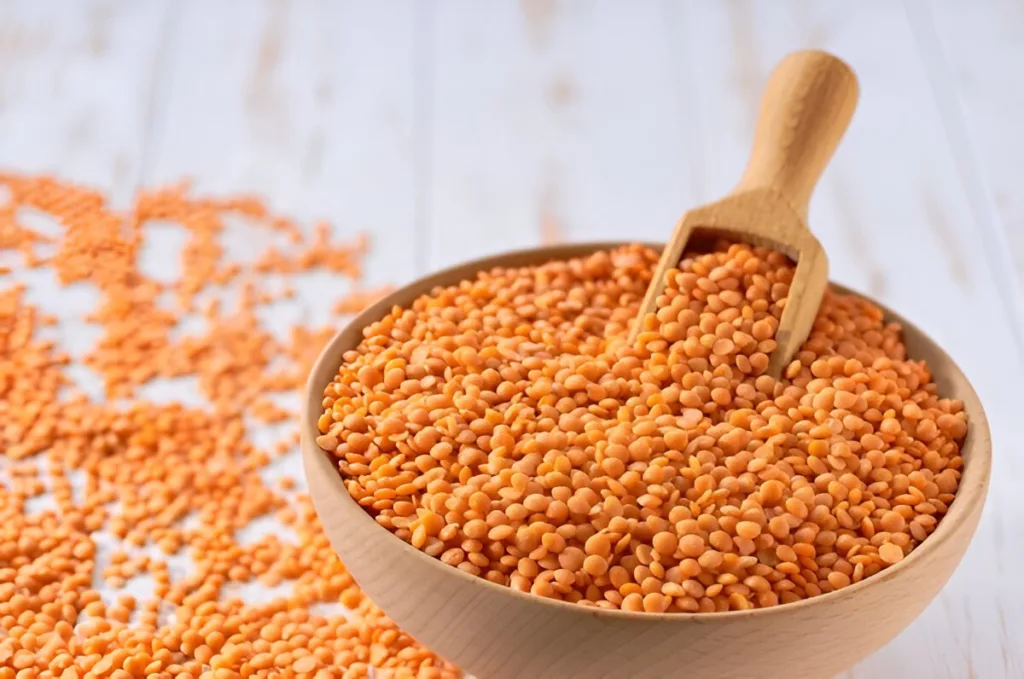
Lean protein sources like lentils are a power-packed source of plant-based proteins and fibre, which makes them excellent for digestive health and keeps you satiated. Packed with essential nutrients like iron, magnesium, potassium, and other vital minerals, they support energy production, muscle function, and cardiovascular health.
Lentils provide up to 18 grams of protein per cooked cup, making them one of the best choices among vegetarians and vegans. If lentils are taken regularly, they also reduce the risk of heart disease and fatty liver.
6. Turkey Breast
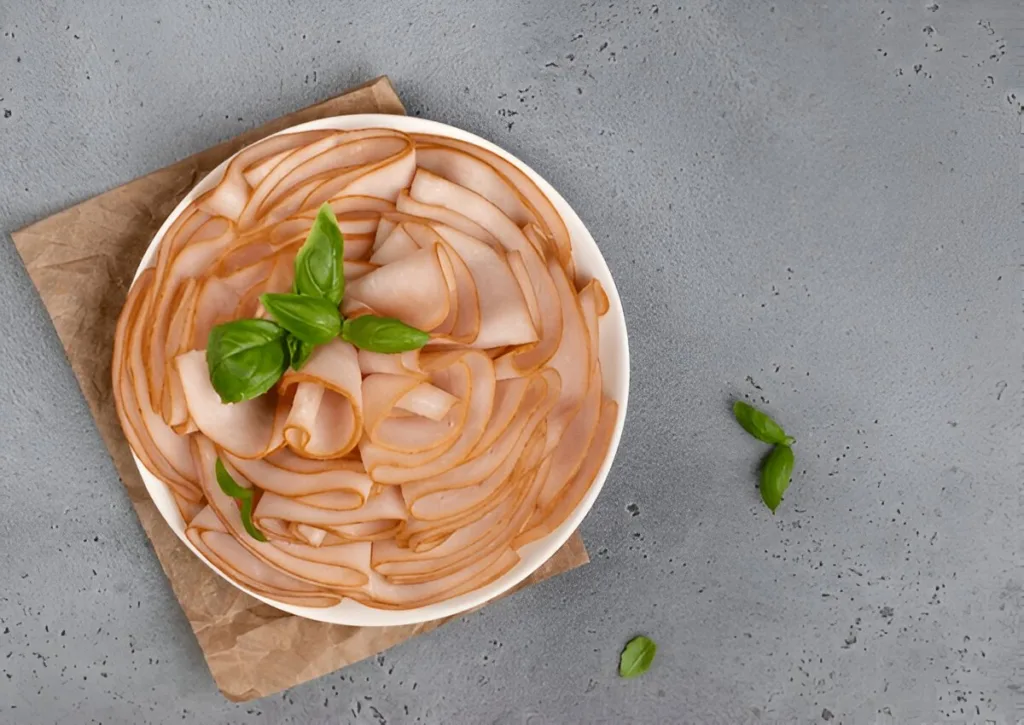
Chicken breast nutrition is a high source of protein, ideal for muscle repair, weight management, and overall health. It also consists of vitamin B, which provides you with metabolic support and aids in energy production.
Half a breast, around 86 grams, provides you with around 26.7 grams of protein and essential minerals like zinc and selenium. These nutrients protect the body cells from damage and support immune health and hormonal balance.
7. Milk
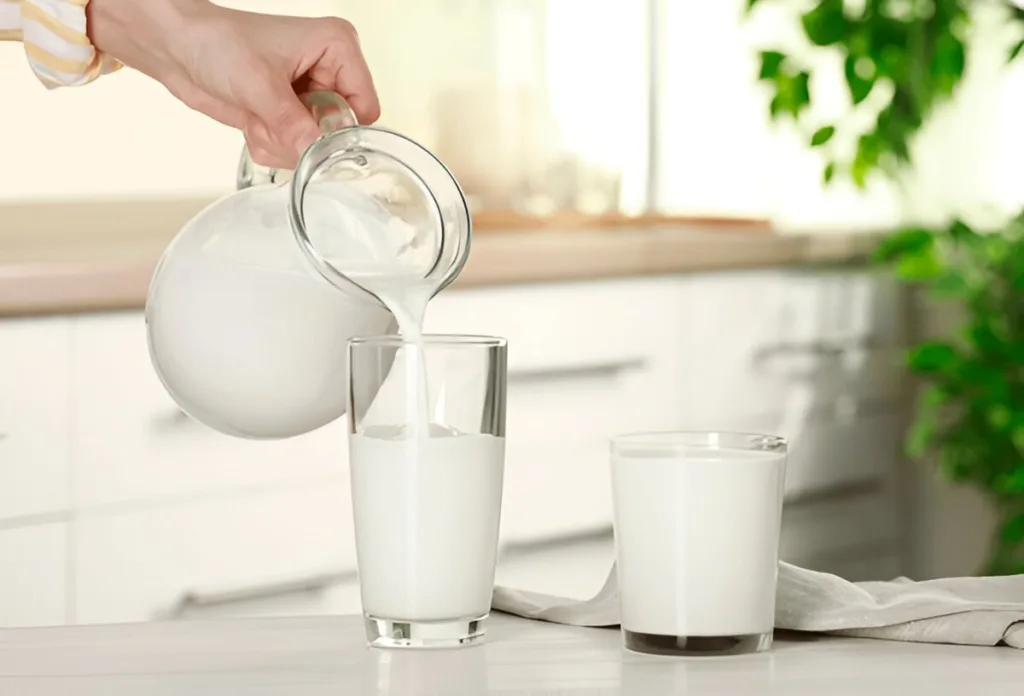
Dairy milk is a highly nutritious beverage with a well-rounded mix of essential nutrients that the body needs. It is enriched with high-quality protein and essential vitamins and minerals such as calcium, phosphorus, and riboflavin, enhancing your metabolism and strengthening your bones.
One cup of milk provides you with up to 8 grams of protein and also supplies vitamin D, which helps your body to absorb calcium more effectively. Milk consists of essential nutrients and is a healthy option for many people, but individuals who are lactose intolerant should go for lactose-free versions. For weight management, opt for low-fat or unsweetened milk varieties that are fat-free, making them one of the best low-fat protein options.
8. Fish
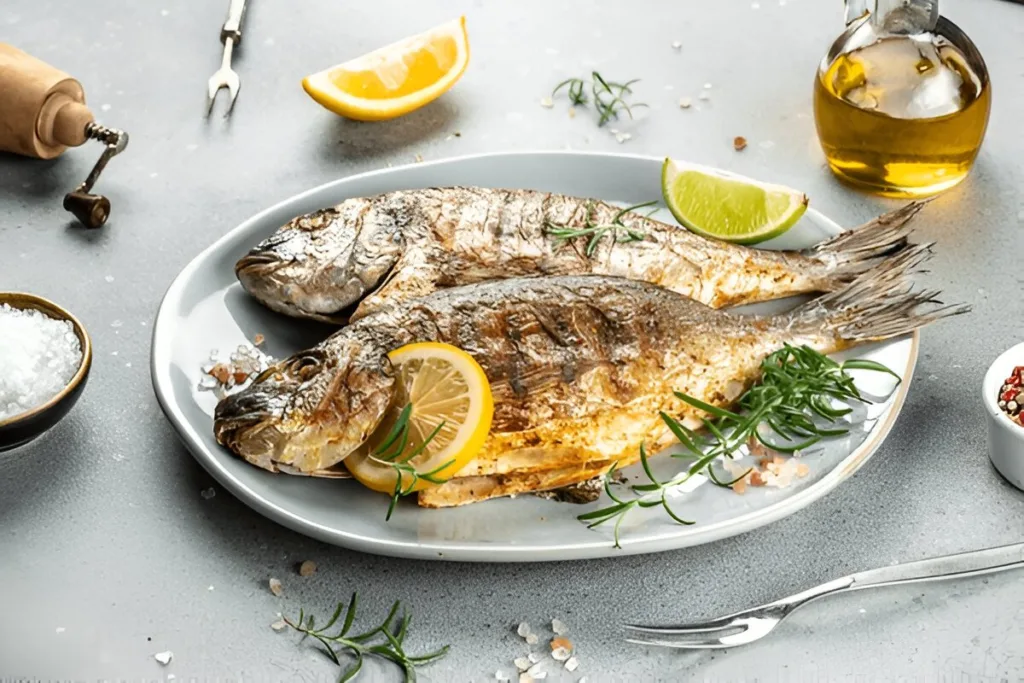
Low-carb, high-protein foods like fish are a good source of protein that is ideal for muscular repair, metabolism support, and overall body function. Fish is rich in nutrients such as iodine, selenium, and vitamin B12, essential for sustaining energy levels, brain health, and a robust immune system.
Regular fish consumption is linked to a reduced risk of heart disease and type 2 diabetes. Fatty varieties like salmon, mackerel, and herring are especially valuable, offering omega-3 fatty acids supporting heart health and lower inflammation. With around 20–25 grams of protein per serving, fish is a nutrient-dense food worth including in your diet.
9. Protein Powder
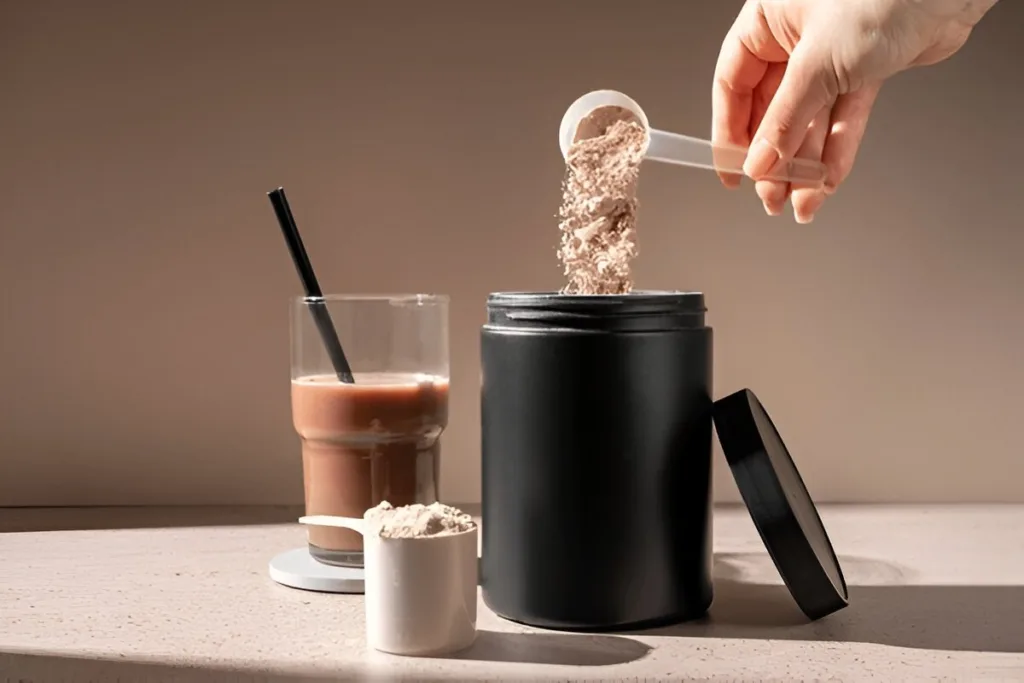
Protein powders are the best option for those individuals who are short on time and need a quick, nutritious boost. Whey protein for fat loss can be mixed with your favourite smoothies, shakes, yoghurt, or energy bars to keep you full longer and prevent muscle injury, especially after workouts or busy days.
Whey, casein, and plant-based powders, like pea protein, offer up to 20–30 grams per scoop. However, this measurement can vary depending on the brand.
| Type | Scoop size | protein |
| Whey | 28.6g | 16.6g |
| Pea | 20g | 15g |
| General | Varies | 20-30g |
10. Chickpeas
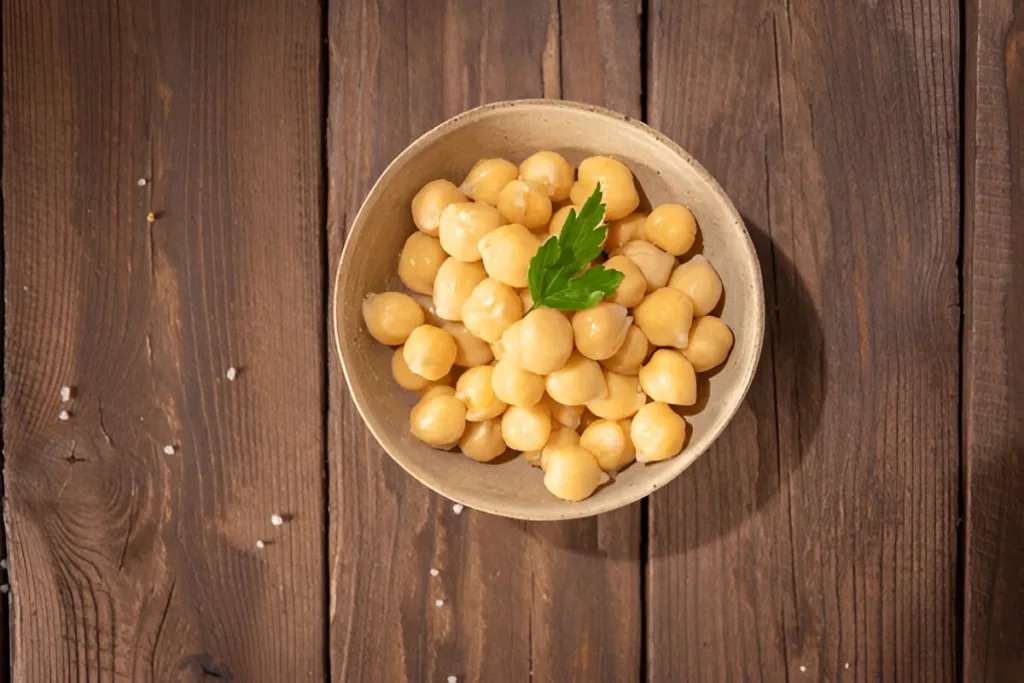
Chickpeas are packed with essential nutrients and are an excellent plant-based protein source. You can use them as a salad with your daily meal, soup, or spread. Rich in fibre, it enhances your digestive health and prolongs your feeling of satiety.
After cooking, it provides approximately 15 grams of protein, making it nutritious and filling. The combination of fibre and protein makes chickpeas an excellent choice for individuals who want to enhance their appetite while boosting their nutrient intake.
11. Tofu
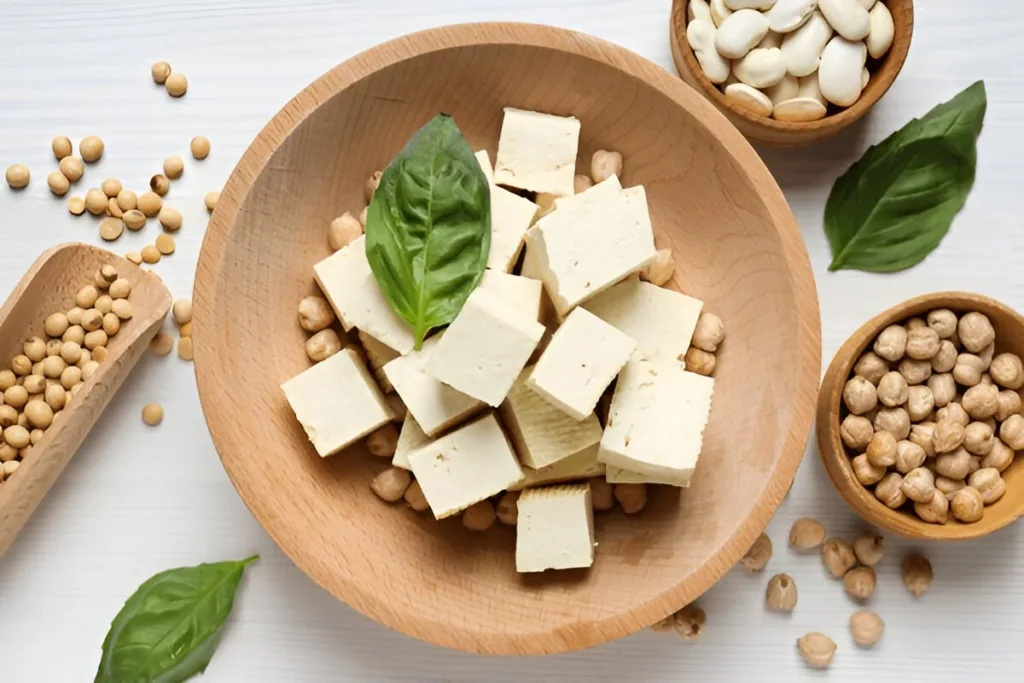
Tofu is a protein-packed food that provides about 17 grams of protein per 100 grams. It is an excellent muscle-building food with essential nutrients like iron and calcium. Tofu is very low in calories, which helps you in your weight loss management.
It is versatile and can be stir-fried, grilled, or blended, as it absorbs flavours well and can be eaten as savoury or sweet dishes. It is nutrient-dense, making it a staple in a plant-based diet.
12. Peanut Butter
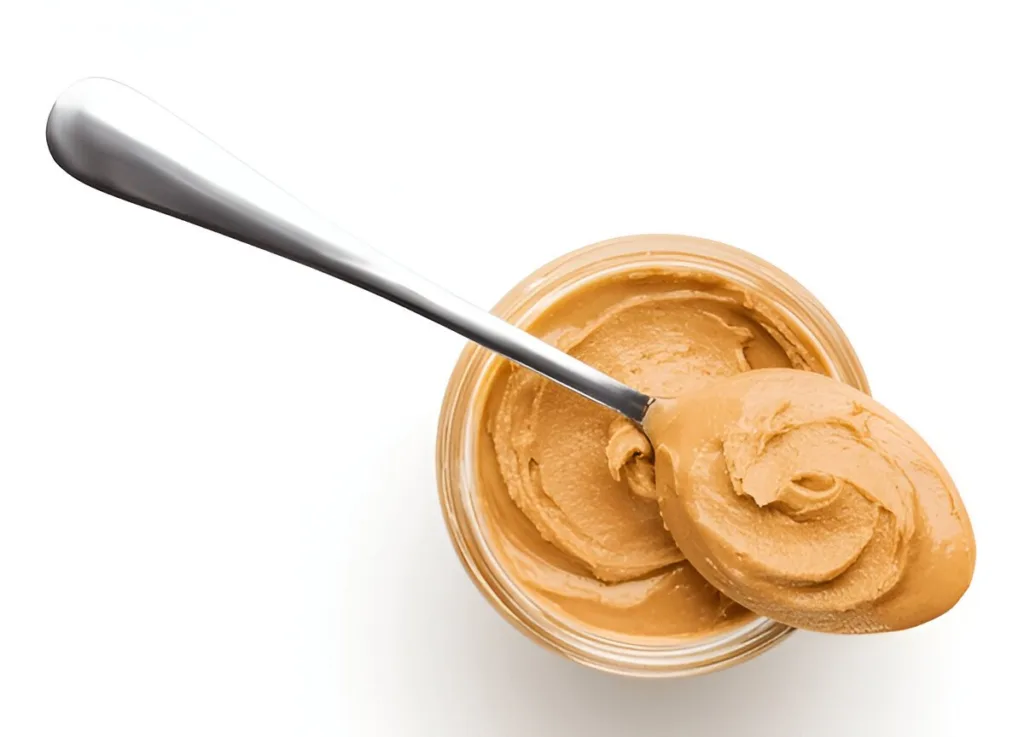
Peanut butter is a tasty and nutritious source of protein and healthy fats, offering about 8 grams per 2-tablespoon serving. When included mindfully in your diet, it can also be a valuable fat-burning protein. Use natural, unsweetened peanut butter to support weight loss while benefiting from vitamins and minerals like folate and magnesium for a healthier option.
Peanuts and peanut butter can help keep you full longer thanks to their high protein content. Adding peanut butter to a high-carb meal may also help prevent blood sugar spikes, making it a great, satisfying addition to your diet. A 1-ounce serving of peanuts provides around 7.3 grams of protein.
13. Pumpkin Seeds
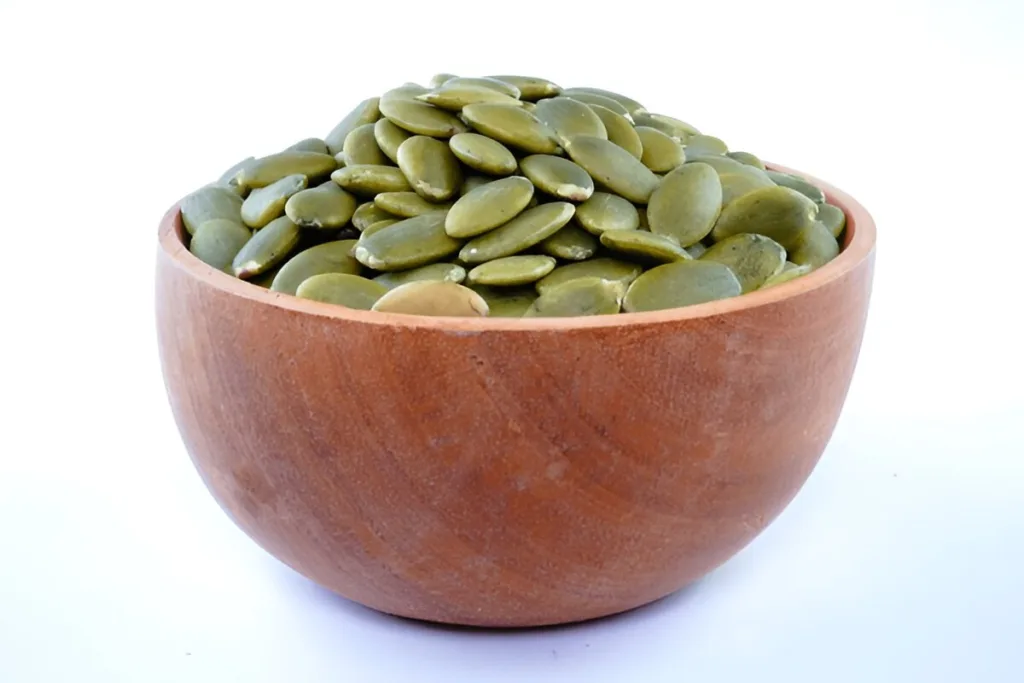
Pumpkin seeds are healthy protein snacks with essential nutrients like magnesium, zinc, and iron. A 1-ounce (28-gram) serving provides up to 7 grams of protein.
Pumpkin seeds are also rich in healthy fats, antioxidants, and fibre, which is very helpful in reducing inflammation and enhancing your digestive health. These are healthy and very beneficial for heart health. Eat them raw, add them to salads or your favourite smoothie, or enjoy them as a snack.
14. Ezekiel Bread
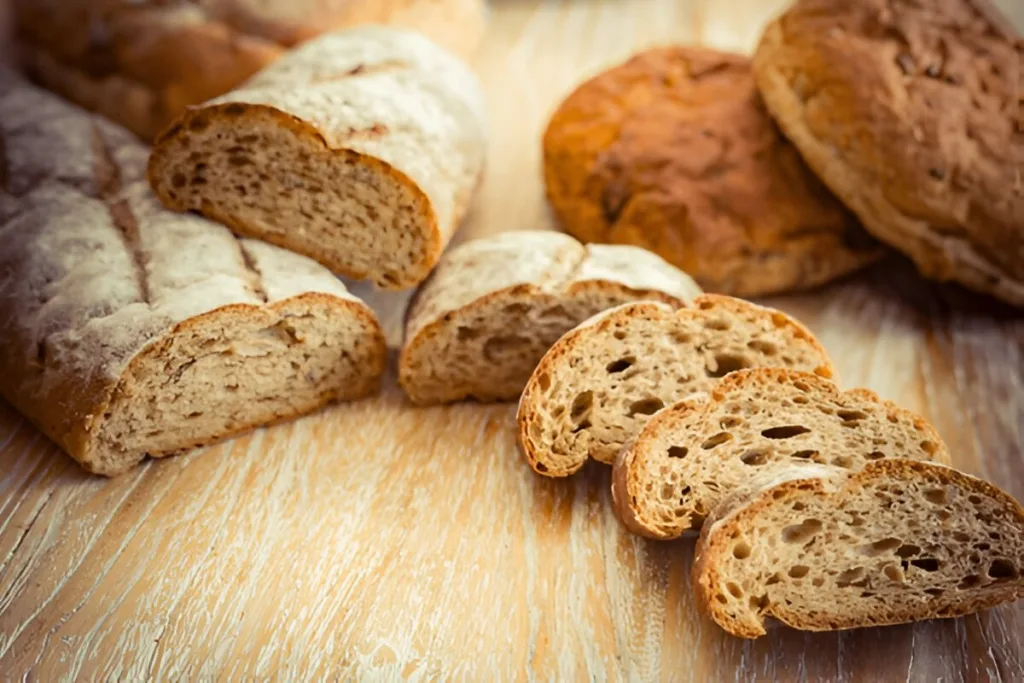
With over 4-5 grams of protein per slice, whole-grain Ezekiel bread is a vibrant source of fibre and protein. It is made with sprouting wheat, barley, beans, and lentils and is filled with nutrients, compared to ordinary bread, and it is effortless to digest.
Vitamins, minerals, and amino acids enhance muscle strength, improve digestion, and boost overall nutrition. It’s great fibre count keeps you full longer and helps regulate blood sugar. The best substitute for refined bread can be used in sandwiches, avocado toast, or as a base for healthy recipes like French toast or a savoury breakfast with eggs and veggies.
15. Almond
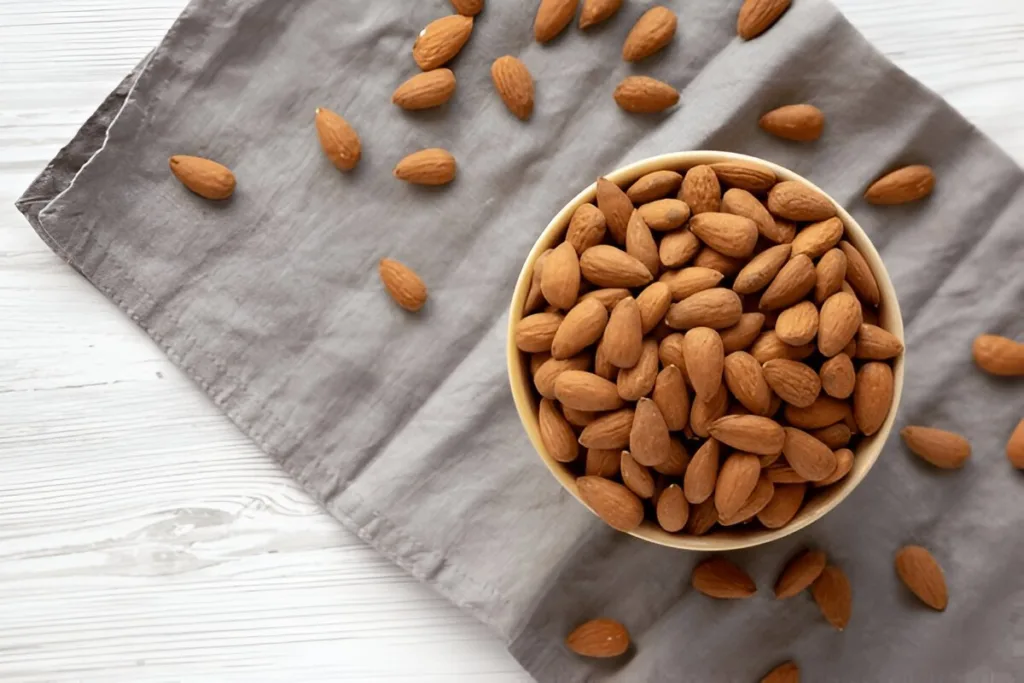
Almonds are a rich source of protein and healthy fats, which gives you about 6 grams of protein per ounce. High fibre enrichment keeps you satiated and aids in digestion. You can also use it as a healthy snack to manage your weight.
Besides being protein-rich, almonds are also packed with vitamins and minerals like magnesium and antioxidants, supporting heart health, skin vitality, and cognitive function. Enjoy them raw or soaked, or add them to your salad. Almonds give you nutritional benefits and a boost, and help you achieve your weight loss goal.
16. Chia Seeds
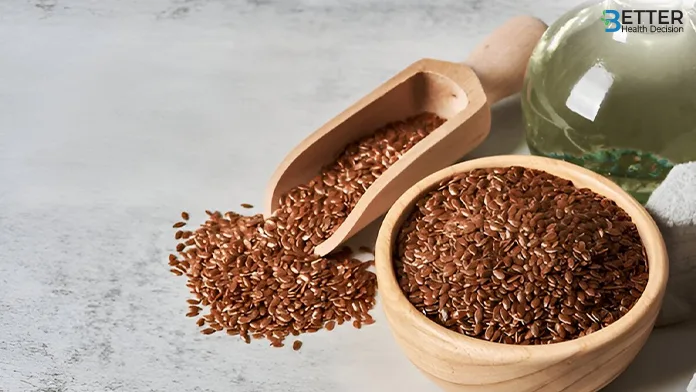
Tiny in size but a rich source of nutrition, chia seeds provide about 4 grams of fat-burning protein per ounce (28 grams). Rich in fibre, omega-3 fatty acids, and antioxidants, they are an excellent addition to your diet.
Enriched with healthy nutrients, chia seeds improve heart health, enhance digestion, and help maintain healthy blood sugar levels. Whether sprinkled on yoghurt, enjoyed as simple chia seed water in the morning, mixed into smoothies, or taken as a pudding, these tiny seeds are a great way to boost your nutrient intake.
17. Oats
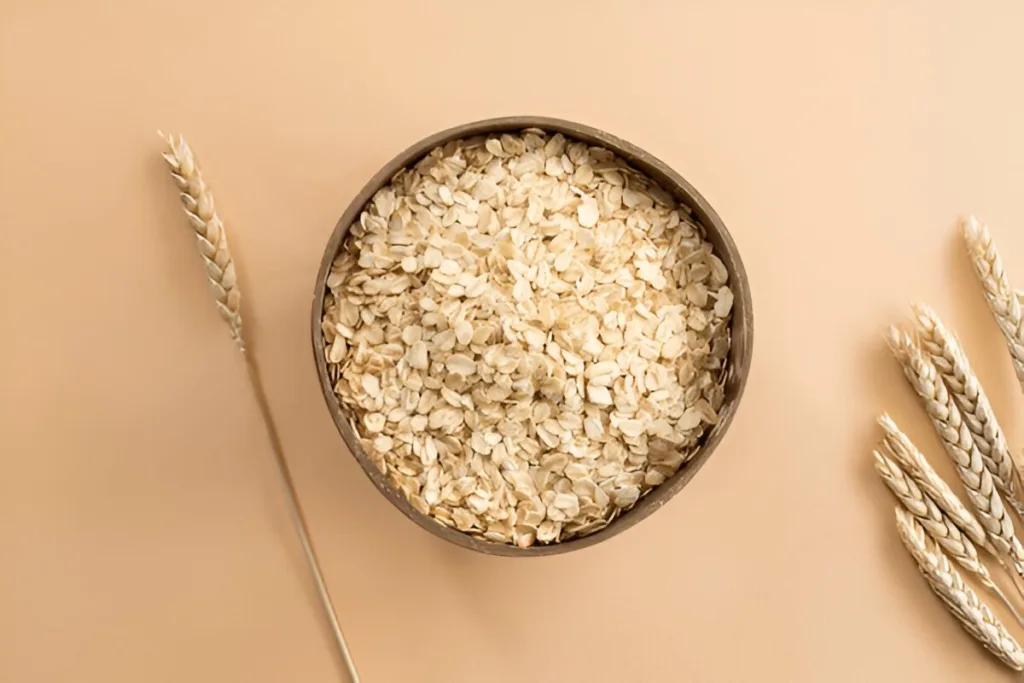
| Type | Serving Size | Protein |
| Oats (Rolled) | ½ Cup (Dry) | 6g |
| Oats ( Steel Cut) | ¼ Cup (Dry) | 7g |
| Oats ( Instant) | 1 Packet (28 G) | 3g |
Oats are a great source of protein, fibre, and complex carbohydrates. They provide a steady release of energy and are versatile, making them perfect for breakfast or adding to smoothies, baked, or savoury dishes.
18. Salmon
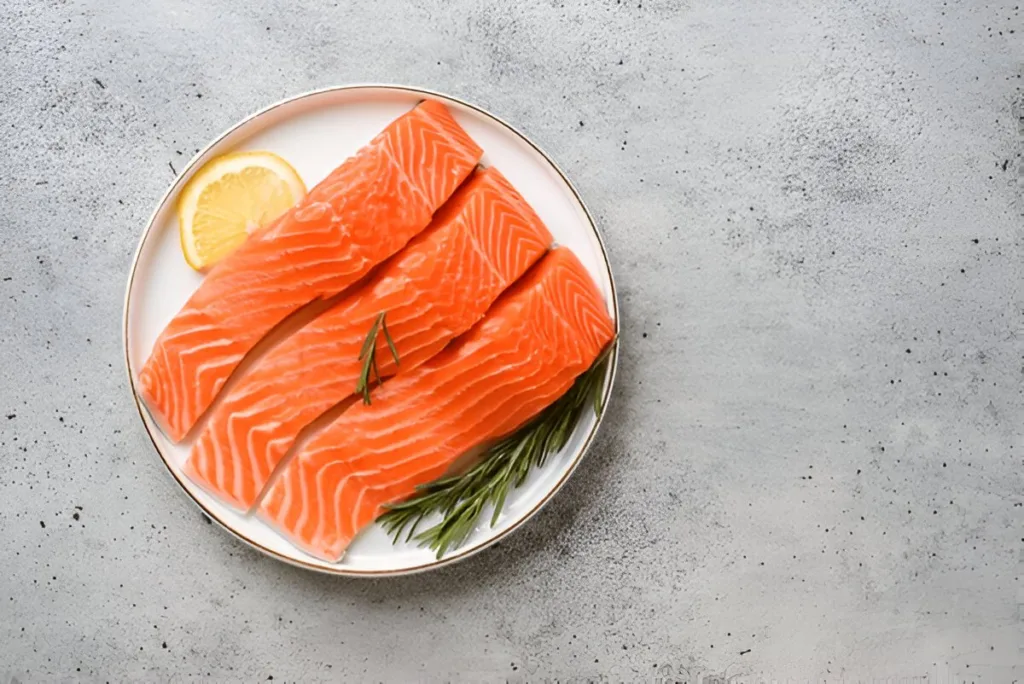
| Type | Serving size | Protein content |
| Cooked Salmon | 3 ounces | 22g |
| Raw Salmon | 3 ounces | 19g |
Salmon is an excellent source of high-quality protein, omega-3 fatty acids, and essential vitamins like vitamin D. It’s perfect for muscle repair, heart health, and overall well-being. Enjoy it grilled, baked, or in salads for a nutritious meal.
19. Sunflower Seeds
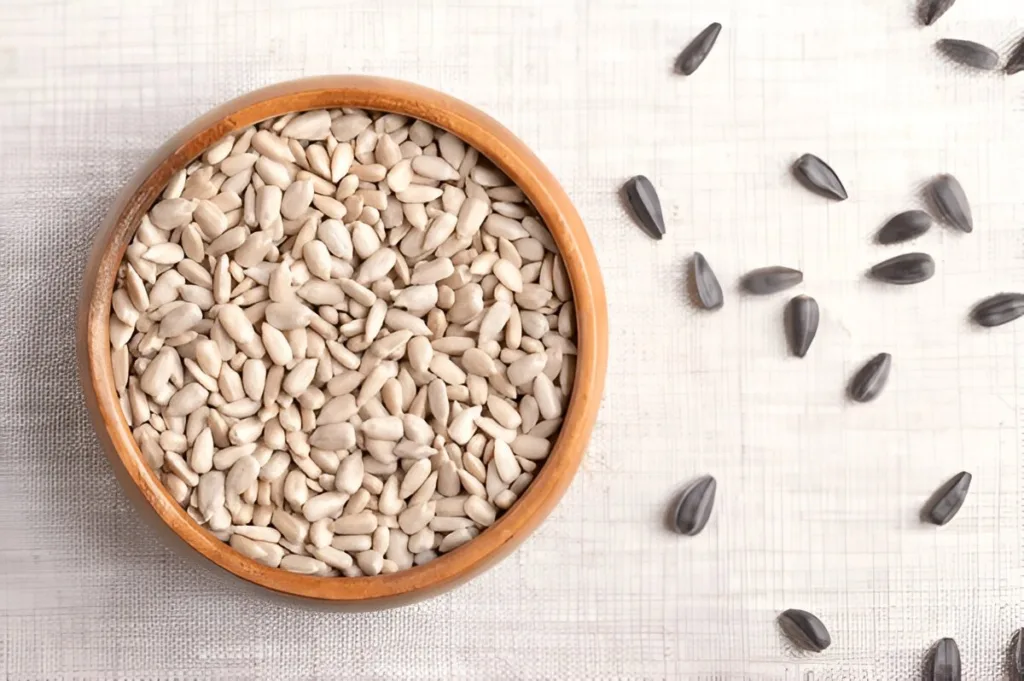
Sunflower seeds are a fantastic plant-based protein source that provides up to 6 grams of protein per ounce. These seeds are also a rich source of vital nutrients like vitamin E, magnesium, and selenium, making your skin healthy and enhancing your immune system.
Additionally, sunflower seeds are rich in healthy fats and fibre, enhancing your energy and digestive health. Whether snacked on raw, added to smoothies, or mixed with salad, sunflower seeds are a versatile and nutrient-rich food supporting weight loss.
Protein content: 6 grams per ounce serving.
20. Black Beans
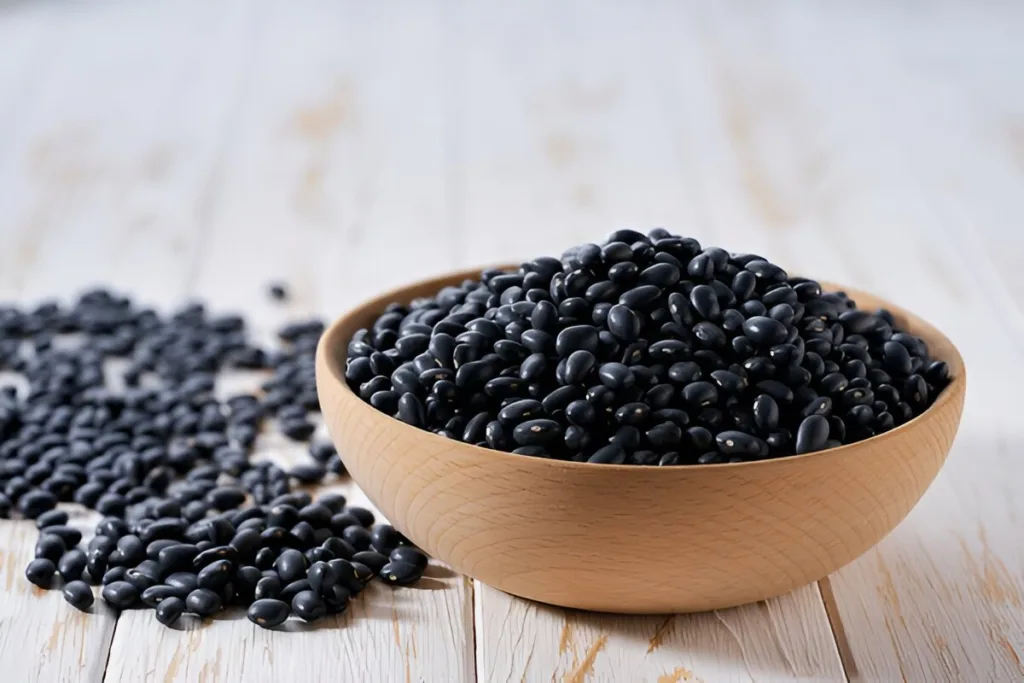
Black beans provide an excellent plant-based protein source, with about 15 grams of protein per cooked cup. Protein is also enriched with fibre, which promotes your digestive health and keeps you full for extended periods, making it one of the best options for people who want to manage their weight.
Black beans are also packed with vitamins and minerals like iron, magnesium, and folate, which elevate your energy levels and amplify heart and muscle health. Due to their versatility, beans can be used in various dishes.
Protein content: 15 grams per cooked cup.
21. Nutritional Yeast
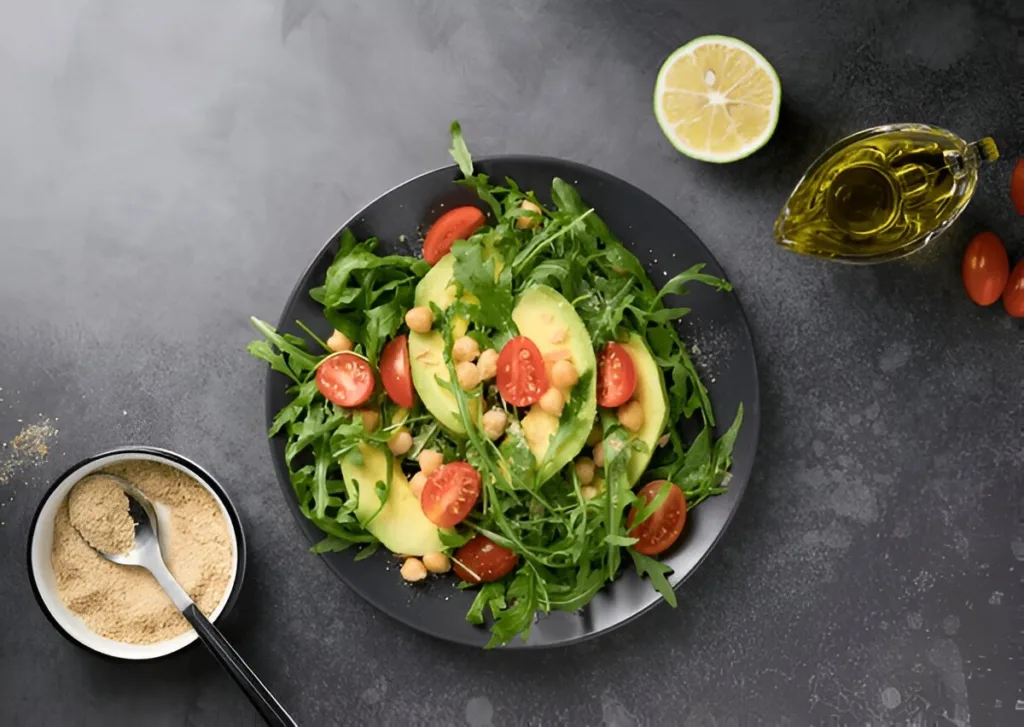
Nutritional yeast is enriched with proteins and vitamins and is a plant-based food that provides 8 grams of protein in just 2 tablespoons. Vitamin B12 present in yeast supports energy and brain health.
Its cheesy, savoury flavour can be used in different food varieties, like with pasta or salads, and its dairy-free nature enhances flavour and nutrition in any meal.
Protein content: 8 grams per 2 tablespoons.
22. Edamame
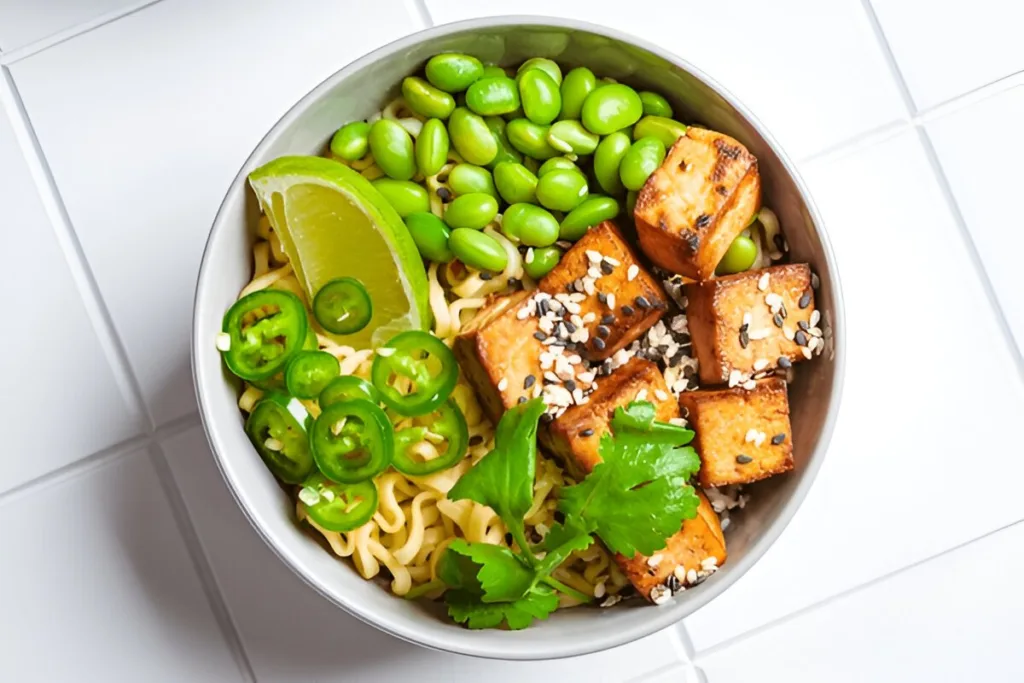
Edamame, also known as young soybeans, is an excellent source of protein that delivers around 18.5 grams per cooked cup. Rich sources of fibre, iron, and calcium, edamame also support muscle growth, strengthen bones, and improve energy levels.
Mild in flavour and easy to prepare, edamame can also be used in different varieties; it can be enjoyed as a snack, tossed into salads, or added to stir-fries. They are wholesome, protein-packed options ideal for vegetarians, vegans, and anyone looking for a nutritious bite.
Protein content: 18.5 grams per cooked cup.
23. Tempeh
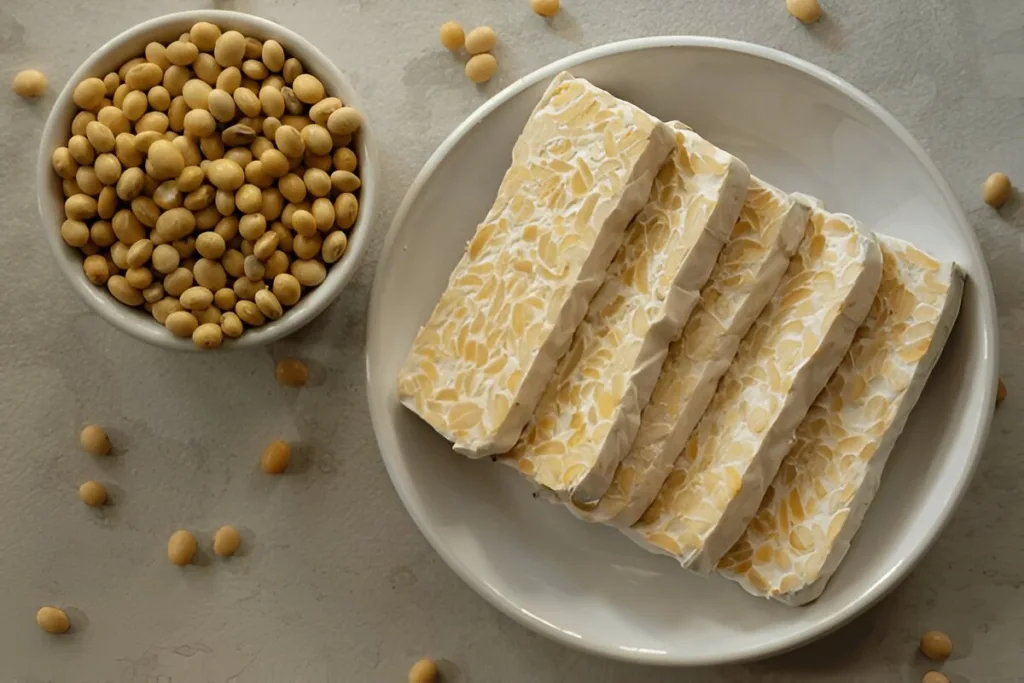
Fermented soybeans, a rich protein source, yield about 31 grams of protein per cooked cup of tempeh. Enriched with gut-friendly probiotics and essential nutrients like iron and calcium, it elevates digestion, improves gut health, and promotes overall health.
Thanks to its nutty taste and firm texture, tempeh works well with wraps, stir-fries, or marinated and grilled food. It is the tasty and natural meat substitute that keeps you satiated, fuels your muscles, and enhances the quality of your balanced plant-based diet.
Protein content: 31 grams per cup
24. Flaxseeds
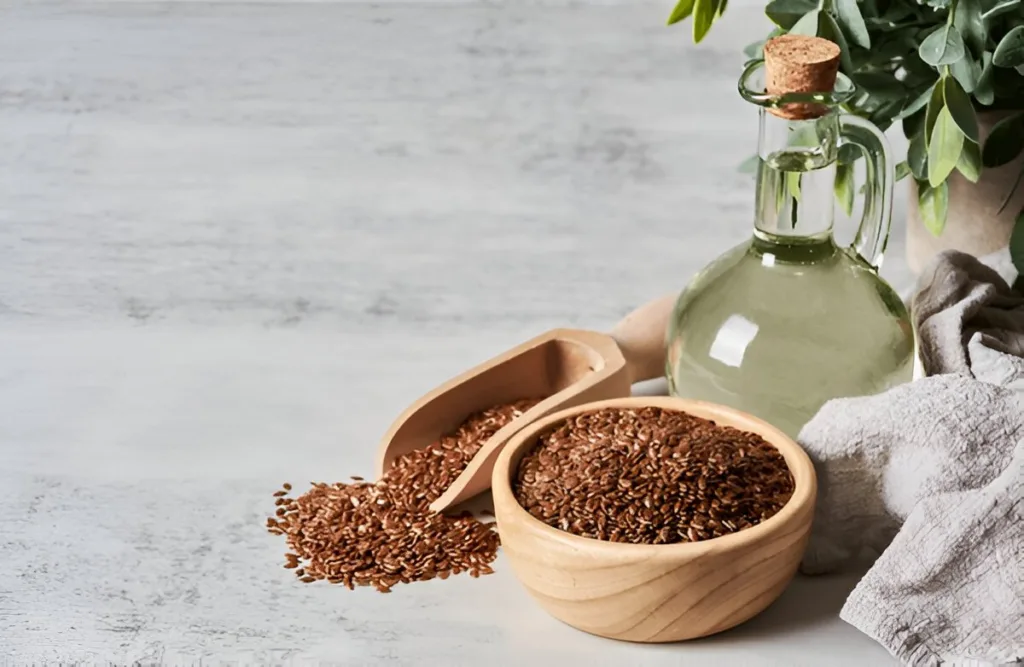
Flaxseeds are also an excellent protein source, providing up to 18% protein per serving. Packed with a variety of other nutrients, including fibre, omega-3 fatty acids, and vitamins, flaxseeds contribute to your overall wellness, especially, and it is best for people who are vegans and vegetarians.
Known for supporting protein for belly fat reduction, flaxseeds are easy to digest, promote digestion, and can be used with various dishes. You can have them as a snack, mix them into your salad, or enjoy them in other dishes.
25. Seitan
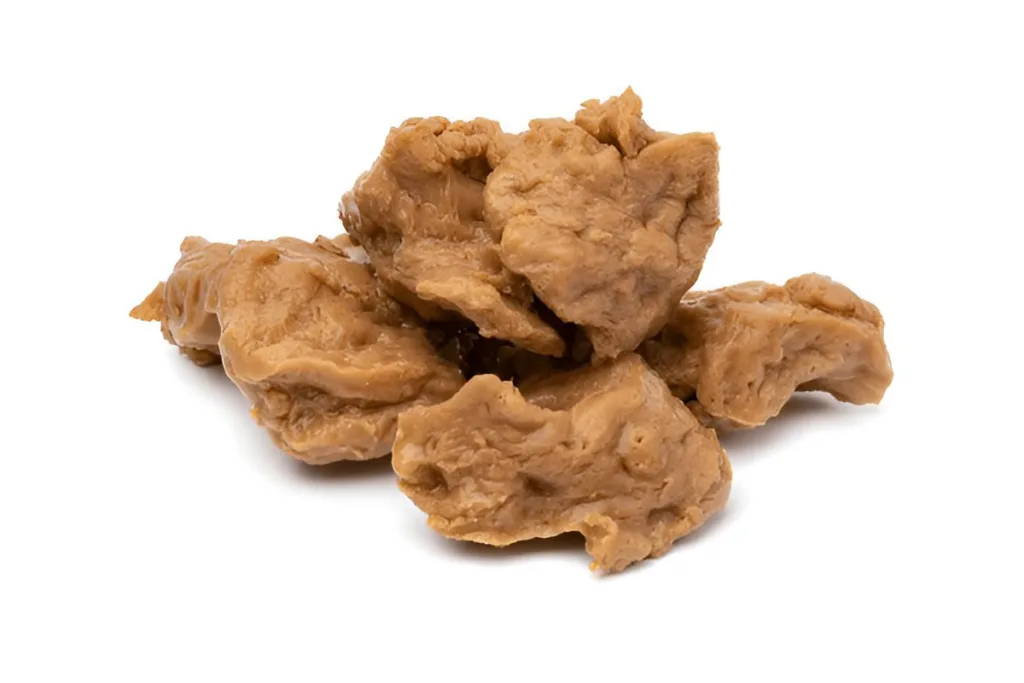
Seitan, also known as “wheat meat,” is a high-protein foods, rich food made from gluten, the primary protein in wheat. It is a substitute for meat and a beneficial option for vegans and vegetarians.
Seitan provides up to 21 grams of protein per 3-ounce serving. It is free from cholesterol and low in fat, and due to its chewy-like texture, it can be used with sandwiches, stir-fries, or grilled dishes, as it easily absorbs flavours and marinades.
26. Hemp Seed
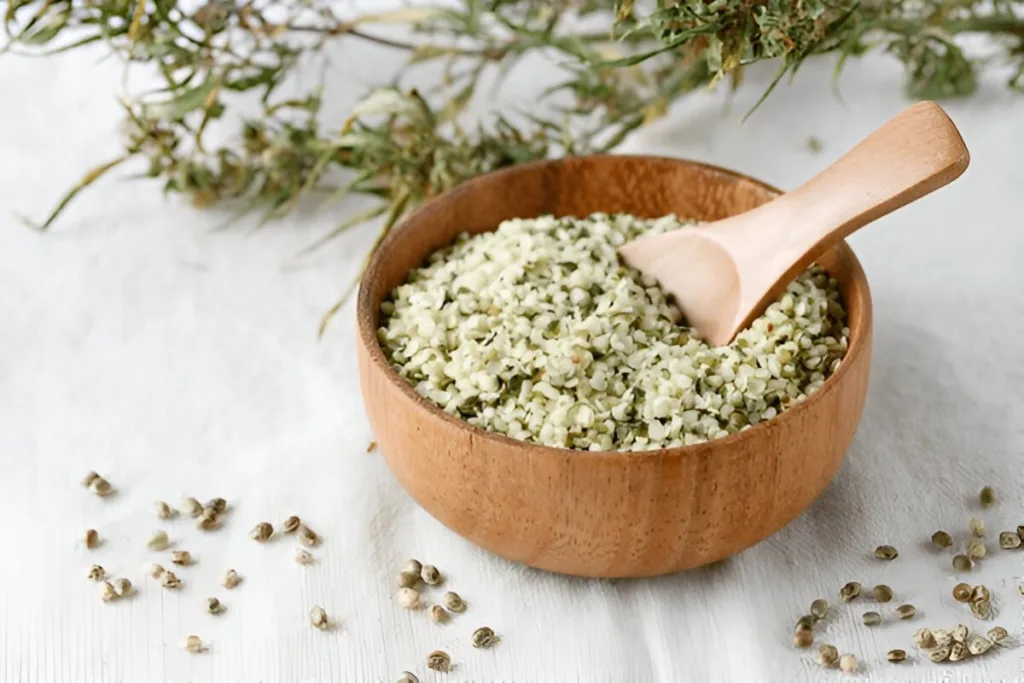
Hemp seed is a plant-based, rich source of protein that contains essential nutrients, including healthy fats and fibres. Omega fatty acids enrich it, aiding digestion, promoting gut health, and boosting energy levels.
These versatile seeds can be used with smoothies, salads, or baked goods and are the perfect addition to your balanced meals as a high-protein diet for weight loss and your fitness goals.
Protein content: 10 grams per 3-tablespoon (30g) serving.
27. Spirulina
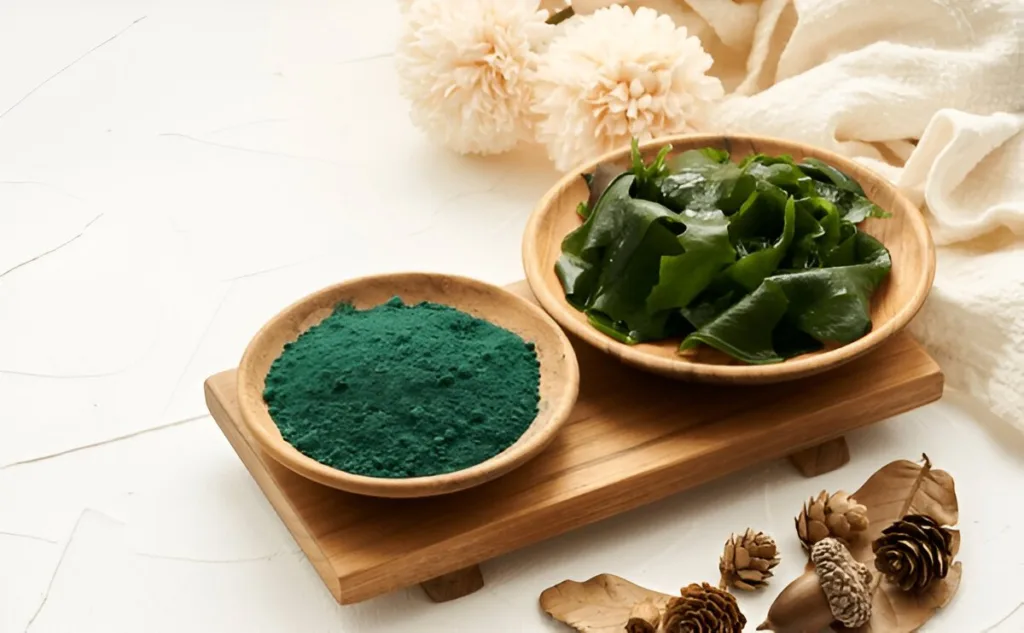
Spirulina is a blue-green alga that is known for its nutritional value. A plant-based protein offers up to 8 grams in a two-tablespoon serving. Apart from protein, spirulina contains essential nutrients like iron, B vitamins, and antioxidants that help reduce inflammation and allergy symptoms.
It boosts nitric oxide, which lowers blood pressure, helps with better blood flow, and detoxifies your body. It blends easily with smoothies, juices, or energy bars, making it a convenient way to boost protein intake for weight loss.
28. Buckwheat
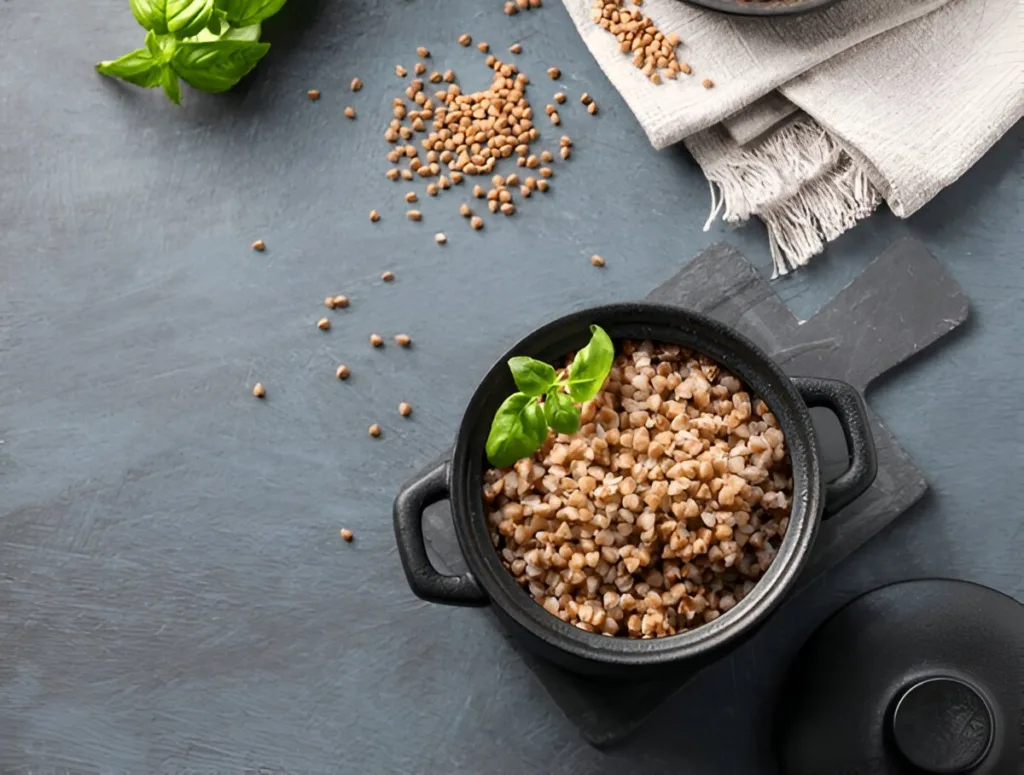
Buckwheat is a highly nutritious, gluten-free seed often used like a grain. It contains plant-based protein, fibre, and key minerals like magnesium, iron, and zinc. One cup of cooked buckwheat provides about 6 grams of high-quality protein, making it a wise choice for vegetarians and anyone aiming to support muscle health naturally.
Thanks to its slow-digesting carbs and protein, buckwheat supports satiety and steady energy, which is ideal for a high-protein diet for weight loss.
Due to its versatility, you can enjoy it in porridge, grain bowls, or as flour in baking.
29. Soy Milk
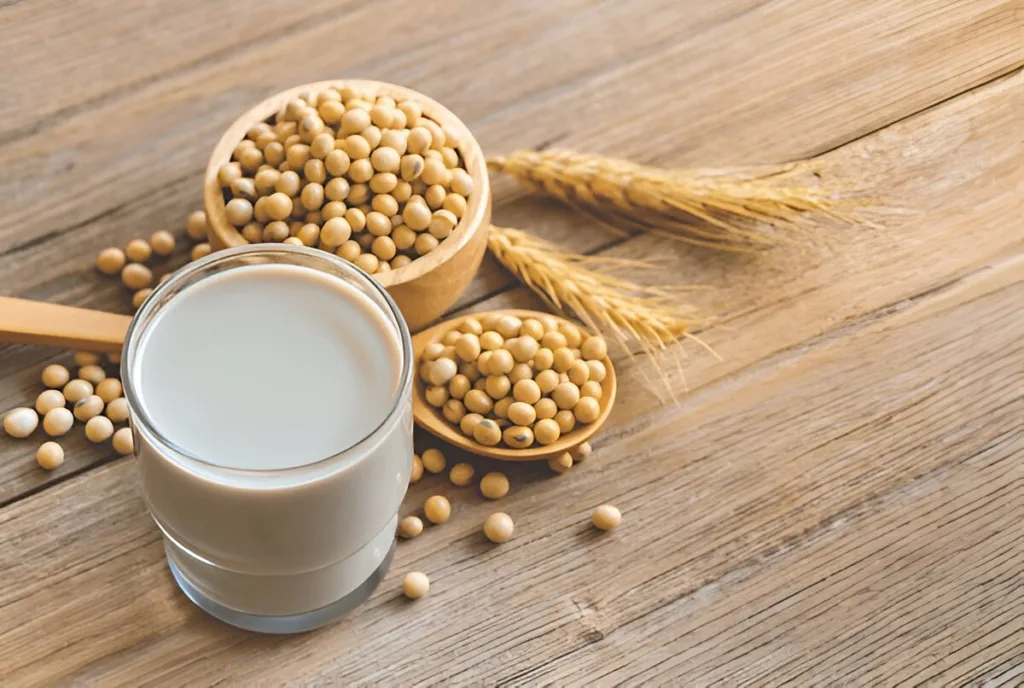
Soy milk is a well-known plant-based dairy milk replacement known for its rich protein content and smooth texture. All essential amino acids required by our body are present in it. It provides up to 7 grams of protein per 1 cup (240 ml) serving.
Soy milk is low in saturated fat and fortified with vitamins like B12 and D. It is also very helpful in maintaining heart and muscle health. It’s an excellent choice for vegetarians following a calorie-deficient, high-protein diet for weight loss.
30. Amaranth
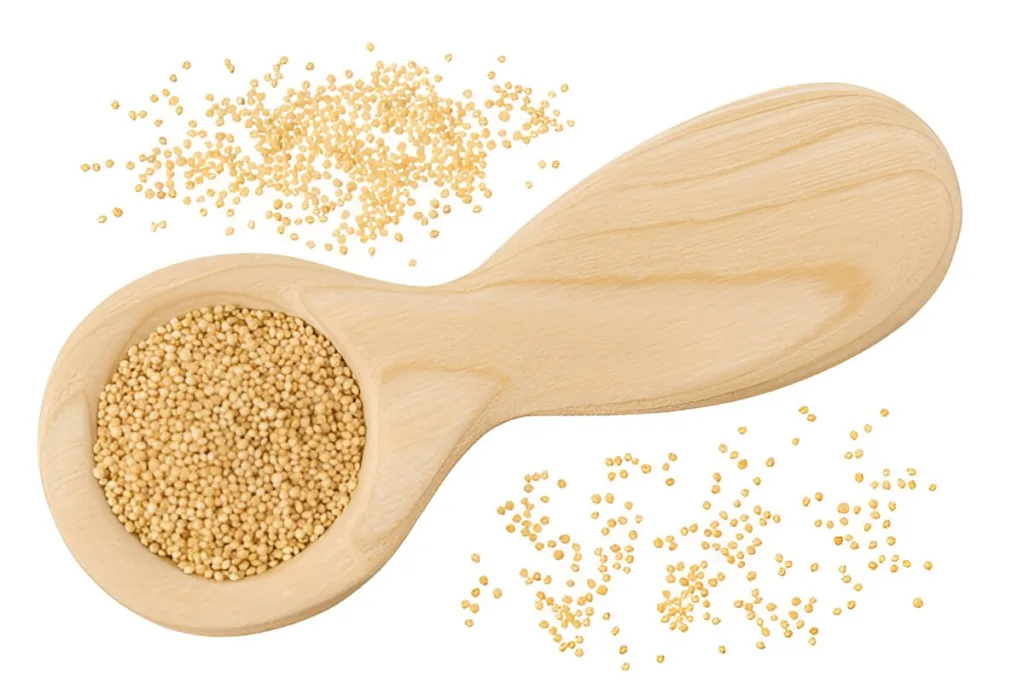
Amaranth is a highly nutritious and gluten-free grain known for its rich protein content. It has anti-inflammatory properties, promotes prostate health, and contains all amino acids and nutrients like fibre, zinc, and selenium.
Enriched with vitamin C and minerals like iron and magnesium, amaranth elevates your overall health. It can be used in porridge or soups and is easily digested, helping to strengthen your immune system and serving as an excellent option for weight loss for those on a high-protein diet.
Protein Diet Plan For Weight Loss
If you are confused about your diet plan, then there is a simple protein-rich diet plan that you can follow that will keep you energised the whole day and help in maintaining your weight loss plan:
| Meal | Food Item | Protein | Calories(approx) |
| Breakfast | 2 scrambled eggs, whole grain toast(1 slice),½ cup greek yoghurt, berries | 20g | 350 kcal |
| Mid-Morning | Smoothie with soy milk, chia seeds, spinach, and 1 scoop of protein powder | 25g | 250kcal |
| Lunch | Grilled chicken(3 oz), quinoa(½ cup), mixed vegetables | 30g | 400kcal |
| Afternoon Snack | Roasted chickpeas or boiled egg with fruit | 10g | 150kcal |
| Dinner | Baked salmon(3 oz) or tofu, broccoli, sweet potato(½ cup) | 28g | 450 kcal |
| Evening Option | Cottage cheese(½ cup) or an almond milk protein shake | 12g | 120kcal |
Frequently Asked Questions
1- How does protein help in weight loss?
A high-protein diet keeps you satiated for a long time, naturally curbs hunger, and prevents overeating. It protects muscle mass while you lose fat and enhances your metabolism rate.
2- What foods are highest in protein?
Proteins from animal sources like meat, eggs, milk, soy, lentils, quinoa, and chickpeas are called complete proteins as they contain all essential amino acids your body requires.
3- What is unique about proteins?
Proteins are made up of amino acids essential for building and repairing tissues. As a key muscle-building food, it also plays a vital role in muscle growth and immune function, produces enzymes, and helps regulate hormones.
4- How much protein for weight loss?
For weight loss, have at least 1.6 to 2.2 grams of protein per kilogram according to your body weight.
5- What is caused by a lack of protein?
A lack of protein can result in muscle wasting, weakened immunity, and fatigue. It may also result in poor skin, hair, and nail health and slower injury recovery.
6- What are the low-calorie protein foods?
Low-calorie protein foods include chicken breast, egg whites, tofu, Greek yogurt, and white fish. They help build muscle and support weight loss without excess calories.

